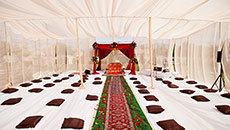Regardless of where we live and what ethnicity we belong to, we have all grown up listening to stories of the princess finding her prince, getting married and living happily ever after. Little girls dream of their own fairy tale wedding, with a beautiful wedding dress, lots of bridesmaids and all the family and friends present to help make the day absolutely wonderful.
The couple spends considerable time and money so that the whole wedding is planned out perfectly and no problem arises to ruin the wedding day. They dream of a happy, joyous wedding leading to a happy, joyous marriage. Unfortunately, the reality is that most couples spend considerable time discussing and planning the wedding of their dreams, but do not spend any time discussing and planning how to have a blissful married life together.
A marriage is a union of two different individuals with two distinct pasts. After these two individuals get married, they will have to find a way to blend their individuality to form a foundation that will carry them through their remaining lives together.
There are many different areas that need to be discussed in order to understand each other’s likes, dislikes, similarities and differences. It is important to look at your family of origin and question your experiences. You should be able to recognize your thoughts, opinions and patterns of behaving, which you learned through your upbringing.
It is not only important to recognize how your family of origin has shaped your thoughts and opinions, but how these will impact your views on different areas of your marriage. Some areas of discussion will require less work whereas other areas may take considerable time or need help from a professional. Finances is known to be the reason for most disagreements within couples, whether dating, engaged or married. In some cases, arguments about family finances can even lead to divorce. Next to finances, household chores are another area of conflict faced by most couples.
Couples may find that their decision to discuss their marriage is well-intended, but find that communicating their thoughts and views is difficult. Many factors can effect communication between partners, such as respect versus disrespect or talking versus listening. Couples who are having difficulty communicating with each other do not need to despair because effective communication can be learned. There are many skills that can be learned to assist couples on how to relate their thoughts and desires to each other. Some examples of these skills are to begin with something positive, listen to one another, do not attack and be aware of your body language.
Most couples do not go into marriage realizing their partner’s views and beliefs, and are shocked that their partner does not agree with them. Usually this awareness of the difference in beliefs only becomes apparent when it becomes an issue between the couple. Couples should be proactive and talk about their values, beliefs and views of a healthy marriage prior to their wedding.
They can either have these discussions on their own, or they can enroll in a marital education course. The purpose of these courses is to provide instruction, resources and skills, in addition to offering support to couples, who are considering marriage. Couples, who participate in these courses, tend to communicate better, solve problems more effectively and report better relationships than those couples, who did not have an opportunity to attend such a course. In short, marital education strengthens the foundation for a stronger marriage.
Being prepared for the reality and challenges of married life helps build a strong foundation to deal with situations that arise post-marriage. With divorce rates around 40 per cent in Canada and 50 per cent in the United States, many couples are deciding to become better prepared for the reality and challenges that come after getting married.
Some people or communities might worry that taking a marital education course may cause a couple to not go through the marriage due to incompatibility; however this is not the role of these type of courses. Marital education is a method to help couples think about their experiences, wishes, desires and to share them with their partner. The course is designed to assist partners in understanding each other, discussing differences in opinion and coming to a compromise that satisfies both partners, or seek professional help, if needed.
Q&A Section
Q: I have a lot of credit card debt and want to know if I should tell my fiancé?
A: Do not keep financial secrets. Hiding debt can destroy your marriage. Remember, secrets do come out and end up causing more problems than if you were upfront at the beginning.
Q: My fiancé likes to have a drink after he gets home from work. Should I be worried?
A: The simple answer is that if you are questioning your fiancé’s drinking, then you should follow up on it. Some things to look for are: does your fiancé use alcohol to relax or fit in? Does your fiancé drink alone? Also, when substances are used more than once in a while, there is a distinct relationship between the use of substances and marital problems.
How to Effectively Communicate with your Partner
1. Be sure your partner is listening. Check to make sure your significant other is not too angry or distracted. Generally, it is advisable to actively check out your partner’s readiness by asking, “Can you listen to me now?”
2. Begin with something positive. Whenever you need to have a serious discussion with anyone, it is always advisable to begin with something positive. Be sincere not artificial.
3. Do not attack. Attacks tend to begin with “you” statements, such as “You are…,” “You never…” or “You always…” The best way to avoid attacking your partner is to try to frame your comments using “I” statements to express your feelings.
4. Do not exaggerate. Exaggeration is one way in which we vent our feelings when we are upset. This may relieve our inner tension but it does not do much to promote marital harmony.
5. Do not mind-read. If you assume that your assumptions of your partner’s motives are completely accurate, you run the risk of inflaming his/her’s temper.
6. Focus on preferences, not principles. Often significant others try to convince each other that they are “right.” In order to “prove” that they are right, they often cite statistics, books and magazine articles. They will assert that their position is “normal” or that “everyone” thinks and acts the way they do.
7. Explain what made you feel the way you did. If you do not explain, in the most specific language possible, exactly how you felt, your partner will not understand what bothered you.
8. Clarify your needs. You will not be able to get what you want from your significant other unless you are able to articulate exactly what your needs are, what bothers you and what you would have wanted done differently.
9. Limit yourself to one or two topics. Partners sometimes find that they have accumulated a long list of complaints and grievances. When each one finally gets his or her turn to be the speaker, he/she often tries to address too many subjects all at once.
10. Allow time for questions at the end. It is always a good idea to stop speaking before your partner loses patience and allow him or her to ask you questions. It is only through the questions of the listener that the speaker’s words are fully understood.




